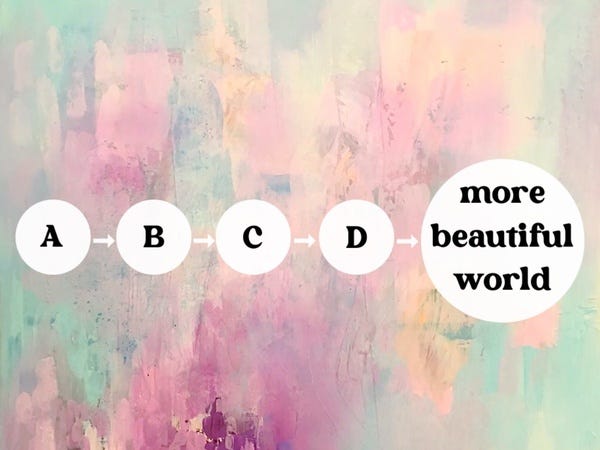ecophilia - fasting, fungi & fractals - on theories of change
Theories of Change offer us causal relationships to make change happen. As a transformation researcher, finding THE theory of change, the one core theory that makes all change towards the Ecocene easier and possible, has been my cup of tea.
I was looking for this:
For me, A, B, C, and D were things inner. Like our psychology, worldviews, paradigms, and state of personal development. In simple terms, my theory of change is (was) that inner transformation leads to outer transformation, that if we become more healthy human beings, we will transition to a more beautiful world.
Although I am not saying that it can’t happen this way, I wonder if I have it upside down.
Reversing Theories of Change
My research in complex systems showed me that linear cause-and-effect relationships are likely not true and that the world functions a lot more chaotically.
I think theories of change make more sense when they begin with the action, the outcome that we want to see. And along the way of trying, particular challenges will come up. Naturally. And once they do, I can find ways to respond to these challenges. It is a very different approach from trying to lay all the groundwork so the anticipated change might eventually happen.
For example, inner turmoil and resistance come up during my current fast. I am trying to convince myself that it is ok to end the fast. I anticipated many of these challenges, yet they feel worse than expected. I read all about it, but it’s very different from what I expected. When I want to do a fast, I can do all the psychological groundwork to prepare me for the fast, yet the only way I can do the fast is to do the fast. Then, when psychological challenges come up, I deal with them.
It’s the same for systematic change. When we want to stop consuming so much stuff, we don’t first stop capitalism, stop companies brainwashing us into buying their sh*t, and then stop consuming. Instead, we stop consuming, and challenges will come up, so we deal with them.
I am not saying that it can’t be helpful to anticipate some of those challenges or that we shouldn’t invest in preparing ourselves psychologically. I am saying that if we work on steps A, B, C, D before we work on the results, we might never get there.
I found common theories of change to be a trap. A distraction. A way to avoid doing the actual work while doing something else in the name of the work that needs to be done.
The Relational Theory of Change (RToC)
I think to come up with more effective theories of change, we need to move from a linear cause-and-effect understanding to a more network-like approach, like this:
The goal should always be the central piece of action, not the end of the line. If I want to consume less, I consume less. Suppose I want to end overexploitation of resources. In that case, I make sure I stop overexploiting resources and don’t wait till my mind is in the right place or till big cooperations stop exploiting resources. This does not exclude taking strategic steps, such as building good relationships with my local politician to get her on my side later when I want to turn my street into a bike lane. Instead, though, bonding with a politician is one bubble in relation to my main goal.
As always, curious about your thoughts.
Jes






